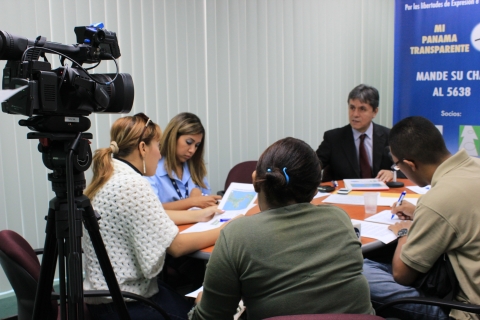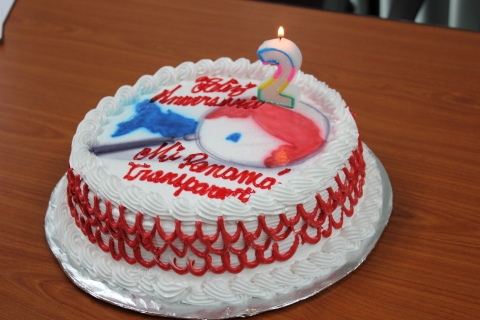
To recognize the two-year anniversary of his digital mapping platform, Knight Fellow Jorge Luis Sierra held a press conference that attracted representatives from all of the Mi Panama Transparente partner organizations.

The anniversary cake included a familiar logo.
One of the most important goals of the Knight International Journalism Fellowships Program is to produce impact that benefits society. I think we have done that in Panama. In the two years since we launched Mi Panama Transparente, the digital map has provided a platform that helps journalists and citizens track crime and corruption across the country. Almost every story published or broadcast by our media partners has made an impact—from a probe of police internal affairs and delivery of medical supplies, to bridge repair and the suspension of a bid on a project due to corruption. These are the results of information from the Mi Panama Transparente mapping platform.
Since June 2012, we have trained 115 journalists across Panama on investigative reporting, ethics, digital tools, multimedia skills and verification. The training workshops have been possible thanks to generous grants from the U.S. Embassy in Panama and the U.S. Department of State. With that funding, we have been able to reach journalists in the provinces who wouldn't otherwise have training opportunities. Those reporters now can find tips for investigative stories from the more than 520 citizen reports that have been sent to Mi Panama Transparente's website. Most of those reports are about corruption (58%) and the rest are about crime.
Reporters who have investigated citizen reports have had a significant impact on the communities they cover:
Edilsa González, a correspondent for La Prensa in the Cocle province, investigated a rural maternal hospital after a citizen reported on the Mi Panama Transparente platform about a lack of medical supplies, equipment and personnel. The hospital, located in the small mining community of Coclesito, didn't have enough doctors or ambulances. After the story was published, the situation improved: A new doctor was hired and more equipment and materials were supplied.
Alexis Charris, an editor for La Estrella, exposed corruption in a bid for the Panama Canal shipyard after a citizen report appeared on the platform. Mi Panama Transparente's website editor Irma Rodríguez followed up, confirming that a member of the Maritime Authority's Board of Directors was the main bidder on a contract to operate the shipyard. Seeing this apparent conflict of interest, Charris and Rodríguez worked together to investigate, collecting interviews and documents and visiting the shipyard. After La Estrella published the story, the company with the suspect ties was suspended from the bid.
The Knight Fellowship has been an extraordinary opportunity to test digital technology for journalistic purposes. Since Mi Panama Transparente was launched, we have customized the Ushahidi platform, gotten a short code for the citizens to send in reports via SMS, and created several social network accounts to promote the website and interact with citizens. Ushahidi is improving the platform after learning more about Mi Panama Transparente's experiences.
With the support of Ronnie Lovler, another Knight International Journalism Fellow, El Tiempo in Bogota—one of the two most important Colombian newspapers—is ready to launch its own crime map modeled on the Panama experience. I am working on a similar platform in Mexico. And media all over Central America have shown interest in building their own platforms.
With so much progress and so many examples of success, we celebrated this milestone second anniversary with a press conference to share the results. The celebration ended on a sweet note—complete with a Mi Panama Transparente logo.